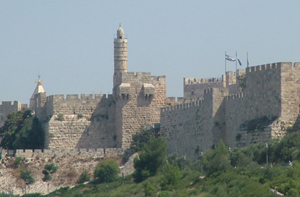
BRUCE C WEARNE, in his examination of the Book of Acts, looks at how Saul – who became Paul – first met with the apostles in Jerusalem…
So that is why, after some time has passed, these Jews hatched a plot to have him killed. But Saul became aware of their plans. They were actively monitoring the city gates, night and day, in order to bring him down. But, under cover of night, the disciples took him in hand, and lowered him in a basket over the city’s wall. And then, when he had made it back to Jerusalem, he endeavoured to align himself with the disciples (there). But all were afraid of him; they (just) could not believe that he was a disciple (one of them). But Barnabas, taking hold of him, found a way to the apostles, and told them the story of how he had seen the Lord on the road, what He had said to him, and how in Damascus he had (already) spoken boldly in the name of Jesus. So (for a time) he aligned himself with them, going out and about in their midst at Jerusalem, preaching boldly in the name of the Lord. He also addressed the Greek-speaking Jews, engaging with them in argument. They also became committed to having him killed. But when the brothers (of the congregation) learned of it, they had him brought down to Caesarea, sending him off to Tarsus. And that is how the congregation (of believers in Jesus) throughout all Judea, Galilee and Samaria found peace (among themselves) and (as a result) thrived. – (Acts 9:23-31/transliteration by Bruce C Wearne)
 |
|
The walls of Jerusalem today where Saul went to meet the initially suspicious disciples. PICTURE: David Kadosh/www.freeimages.com
|
Luke tells us that with Saul’s defection he became the target of the very operation he had led. Saul had intended to arrest, imprison, try and stone the believers, but now his former colleagues were hunting him down. His life could never be the same.
Luke’s inclusion of these details accords with Paul’s own accounts where he explains himself in the face of the merciless opposition of Jewish interests, in Jerusalem (Acts 22) as well as in Gentile domains (II Corinthians 11:31-33). But he had already been forewarned of this opposition (Acts 22:17-21). These important details give us a picture of how a Christian-Messianic profession of faith first came to have significant historical consequences in Gentile lands. It found itself distinguished from the opposition mounted by powerful interests that resisted any challenge to their control of synagogue, temple, or wherever the Judaic religion had gained a foothold (that is, “the Jews”).
In Paul’s terms this was nothing but a continuation of a persecution that he had initiated against Jesus. Thus, there was deep tension in how the rulers of civil society, across the Mediterranean world, would deal with this intense conflict with its intra-Jewish character. But this tendency has long repeated itself again and again in “Christian history” ever since as new believers of “the way” confront established misunderstanding of what is now required by the God of Israel’s Messiah. When such dissenters are embraced by the freely offered love of Christ Jesus, they receive “the peace which passes all understanding”. And that, in a nutshell, is Paul’s Gospel.
Paul escaped from Damascus and tried to find his place among the disciples in Jerusalem. The disciples were not exactly confident about him. That is when Barnabas entered our story. Barnabas attested to his conduct in the synagogue at Damascus. And so Saul became a part of the church.
It would seem that this could have so easily been resisted as an elaborate ‘sting’ designed to entrap the entire apostolic leadership. There must have been reservations of this kind among Jesus’ disciples. But the guidance of the Holy Spirit prevailed.
Luke uses the term “Hellenists” here. He has used the term “Jews” for those who did not accept the Messiah. But we encountered this term in chapter six and there, presumably, it was the “murmuring” of a “Hellenistic” group of believers that led the apostles to lay hands on the seven chosen deacons for the food distribution. Luke here says Saul was disputing with the Hellenists who conspired to have him killed. Could these have been Hellenists who believed in Christ? Many such believers had been forced to flee in the persecution mounted by Saul. Now we find him in dispute with Hellenists, even as he, inch-by-inch, is being transformed and refreshed by the very message Stephen had proclaimed before the Sanhedrin. That message clearly announced that the Old Testament story of God’s covenant with Israel only makes sense in terms of the coming of the Messiah, whose resurrected rule has to be proclaimed to all nations. And in these terms Paul’s life was under threat.
It is not always clear how certain groups Luke refers came to be protected or why they were at risk. Who was fighting whom? Clearly, after making known his opposition to the persecution he had previously organised, Saul was in the firing line. Having been confronted by the Messiah, who Paul had been persecuting, Saul knew that he now lived by the mercy of this same Jesus, His Redeemer. And so, he had to be smuggled back to Caesarea, perhaps to stay with Philip along the way, and then he was sent back home to Tarsus. He had to prepare himself for what the Lord Jesus wanted him to do.
Luke notes this occurred at a time of unprecedented peace and unity for the young church. The unity of Galilee, Judea and Samaria was proof positive that something mighty had taken root in their midst.
Got a verse or a short passage you’d like us to look at? Just send an email to [email protected].





